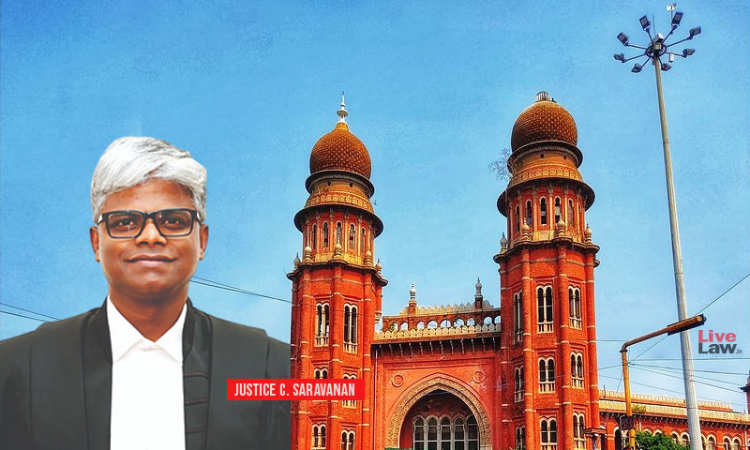- Home
- /
- High Courts
- /
- Madras High Court
- /
- Approval From Higher Authority...
Approval From Higher Authority Mandatory For Issuing Notice U/S 148 Income Tax Act After Expiry Of 3-Year Limitation: Madras High Court
Mehak Dhiman
3 Nov 2025 7:25 PM IST
The Madras High Court has held that under the new regime, approval from a higher authority, such as the Principal Chief Commissioner of Income Tax or the Principal Director General, is mandatory to issue a notice under Section 148 of the Income Tax Act after the expiry of a three-year limitation period. Justice C. Saravanan stated that …….three years from the end of the...
The Madras High Court has held that under the new regime, approval from a higher authority, such as the Principal Chief Commissioner of Income Tax or the Principal Director General, is mandatory to issue a notice under Section 148 of the Income Tax Act after the expiry of a three-year limitation period.
Justice C. Saravanan stated that …….three years from the end of the Assessment Year 2016-2017, 2017-2018 and 2018-2019, to issue Section 148 Notice under the new regime had already expired on 31.03.2020, 31.03.2021 and 31.03.2022. However, Section 148 Notices were issued for these Assessment Years only on 29.07.2022 with approval from the Principal Commissioner instead of approval from the Principal Chief Commissioner in terms of amended provisions as in force for the period in dispute were in time…….
In this case, the issue pertained to (A.Y. 2016-2017 to 2018-2019) Notices issued under Section 148 of the Act as it stood prior to 01.04.2021 and on account of the complication due to interpretations placed by the Supreme Court in Union of India v. Ashish Agarwal, (2023) 1 SCC 617, on the limitations under the new regime with effect from 01.04.2021 in Chapter XIV of the Income Tax Act.
As per the assessee, under the new regime, the competent authority for approval of sanction for issuance of Notice under Section 148 of the Act for the period from 01.04.2021, the relevant authority is the Principal Chief Commissioner or Principal Director General or Chief Commissioner or Director General, if more than three years have elapsed from the end of the relevant Assessment Year. Therefore, prior approval granted by the Principal Commissioner is grossly invalid and illegal and clearly amounts to a lack of jurisdiction.
The revenue argued that the Proviso to Section 151 of the Act expressly stipulates that for the purpose of calculating the year limitation period for obtaining sanction, the duration of stay and the time granted to the assessee for submitting a reply must be excluded. The sanction was also duly obtained from the Specified Authority as required under Section 151 of the Act.
Background
After the introduction of the new provision with effect from 01.04.2021 in Chapter XIV of the Act, Notices were issued under Section 148 of the Act where income had escaped assessment.
These Notices were issued under Section 148 of the Act under the old regime as in force till 31.03.2021. Thereafter writ petition was filed in various High Courts, where Notices issued on or after 01.04.2021 under the old regime as in force till 31.03.2021 were challenged.
The case came to the Supreme Court in Union of India v. Ashish Agarwal where it was held that the notices issued under Section 148 of the Act as in force till 31.03.2021 between April 1, 2021 and June 30, 2021 were deemed to have been issued during the period were stayed till the date of supply of the relevant information and material by the Assessing Officer to the assessee.
The decision of the Supreme Court in the Ashish Agarwal case referred to supra as which was implemented by CBDT vide Instruction No.1/2022 dated 11.05.2022, was re-examined by a larger bench of the Supreme Court in Union of India vs. Rajeev Bansal, 2024 SCC Online SC 2693.
The Supreme Court in the Rajeev Bansal case, thus, held that the combined effect of the legal fiction and the directions issued by the Supreme Court in the Ashish Agarwal case was that the time begins to run for an assessee to respond to the show-cause notices, after the supply of the relevant material and information to the assessee.
Observation By the Court
In the case of an Assessee whose income has escaped assessment, where the Assessment Year would have fallen within the four-year limitation under the old regime cannot be proceeded further unless an approval is obtained from the specified authority under Section 151(ii) of the Act. However, as per the proviso to Section 151 of the Act, the period of three years for the purposes of clause (i) shall be computed after taking account the period of limitation as excluded by the third or fourth or fifth provisos or extended by the sixth proviso to sub-section (1) of Section 149 of the Act inserted vide Finance Act, 2023…..
Since a sanction was obtained only from the Principal Commissioner of Income Tax, and since more than 3 years have lapsed, the Notices issued under Section 148 of the Act and orders passed thereafter, and the notices issued under Section 271(1)(c) are liable to be set aside, stated the bench.
In view of the above, the bench remitted the matter back to the department to issue a fresh notice under Section 148 of the Act after obtaining sanction from the Principal Chief Commissioner of Income Tax or the Principal Director General, as is contemplated under Section 151 of the Act.
Case Title: D. Tamilselvi v. The Income Tax Officer
Citation: 2025 LiveLaw (Mad) 395
Case Number: W.P.(MD)Nos.30938
Counsel for Petitioner/Assessee: P. Madhavan
Counsel for Respondent/Department: N. Dilip Kumar
Click Here To Read/Download The Order



